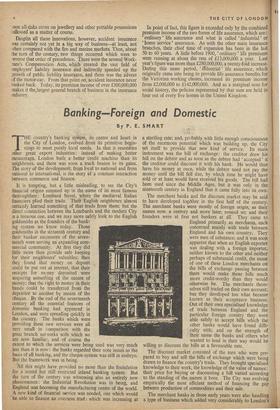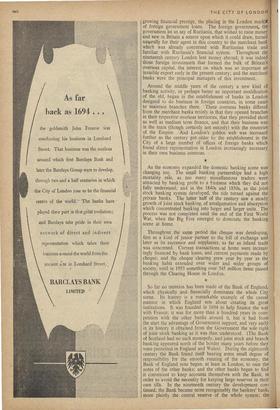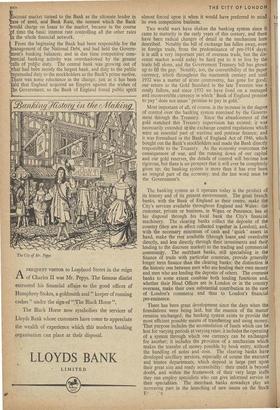Banking Foreign and Domestic
By P. E. SMART
THE country's banking system, its centre and heart in the City of London, evolved from its primitive begin- nings to meet purely local needs. In that it resembles other great export Industries: instead of making better mousetraps, London built a better credit machine than its neighbours, and there was soon a track beaten to its gates. The story of the development, from local to national and from national to international, is the story of a constant interaction between commerce and finance.
It is tempting, but a little misleading, to see the City's financial origins summed up in the name of its most famous thoroughfare : Lombard Street, where the medimval Italian financiers plied their trade. Their English neighbours almost certainly learned something of that trade from them; but the direct connection between the Lombards and the modern City is a tenuous one, and we may more safely look to the English goldsmiths as the founders of the bank- ing system we know today. Those goldsmiths in the sixteenth century and their banker successors of the seven- teenth were serving an expanding com- mercial community. At first They did little more than provide safe keeping for their neighbours' valuables; then they found that money on deposit could be put out at interest, that their receipts for money deposited were acquiring something of the nature of money; that the right to money in their hands could be transferred from the depositor to another by means of the cheque. By the end of the seventeenth century all the essential features of domestic banking had appeared in London, and were spreading quickly in the country. The banks which were providing these new services were all very small in comparison with the great 'branch networks with which we are now familiar, and of course the extent to which the services were being used was very much less than it is now: the banks regarded their note issues as the basis of all banking, and the cheque system was still in embryo. But the framework was in being.
'AU this might have provided no more than the foundation for a sound but still restricted inland banking system. But the turn of the century was witnessing also an entirely new phenomenon : the Industrial Revolution was in being, and England was becoming the manufacturing centre of the world. A new kind of financial service was needed, one which would a startling rate; and, probably with little enough consciousness of the enormous potential which was building up, the City set itself to provide that new kind of service. Its main instrument was the bill of exchange : the creditor drew his bill on the debtor and as soon as the debtor had 'accepted' it the creditor could discount it with his bank. He would thus have his money at once, while the debtor need not pay the money until the bill fell due, by which time he might have sold or at least would have received his goods. The bill had been used since the Middle Ages, but it was only in the nineteenth century in England that it came fully into its own.
The merchant banks and the discount market may be said to have developed togcLher in the first half of the century. The merchant banks were mostly of foreign origin, as their names now, a century and more later, remind us; and their founders were at first not bankers at all. They came to England primarily as merchants, each concerned mainly with trade between England and his own country. They were men of substance; and it was soon apparent that when an English exporter was dealing with a foreign importer, neither known to the other and neither perhaps of substantial credit, the name of one of these London merchants on the bills of exchange passing between them would make those bills much more credit-worthy than they would otherwise be. The merchants them- selves still traded on their own account; but they developed too what became known as their acceptance business. Out of their own specialised knowledge of trade between England and the particular foreign country they were able safely to accept bills which the other banks would have found diffi- culty with; and on the strength of their name the banks and others who wanted to lend in their way would be willing to discount the bills at a favourable rate.
The discount market consisted of the men who were pre- pared to buy and sell the bills of exchange which were being drawn to finance the country's trade. They brought specialised knowledge to their work, the knowledge of the value of names : their price for buying or discounting a bill varied according to the standing of the names it bore. The City was evolving empirically the most efficient method of financing the gap between production of commodities and their sale. growing financial prestige, the placing in the London markillt of foreign government loans. The foreign government, the government let us say of Ruritania, that wished to raise money and saw in Britain a source upon which it could draw, turned natorally for their agent in this country to the merchant bank which was 'already concerned with Ruritanian trade and familiar with Ruritania's financial system. Throughout the nineteenth century London lent money abroad; it was indeed those foreign investments that formed the bulk of Britain's overseas capital. 'the interest on which was so important an invisible export early in the present century; and the merchant banks were the principal managers of this investment.
Around the middle years of the century a new kind of banking activity, or perhaps better an important modification of the old, began in the establishment of banks in London designed to do business in foreign countries, in some cases to maintain branches there. These overseas banks differed from the merchant banks mainly in that they opened branches in their respective overseas territories, that they provided short as well as medium term finance, and that their business was in the main (though certainly not entirely) with the countries of the Empire. And London's golden web was increased further as the century got older by the establishment in the City of a large number of offices of foreign banks which found direct representation in London increasingly necessary in their own business overseas. - * As the economy expanded the domestic banking scene was changing too; The small banking partnerships had a high -mortality rate, as too many miscellaneous traders were attracted by banking profit to a business which they did not fully understand; and in the 1840s and 1850s, as the joint stock banking system developed, the tide turned against the private banks. The latter half of the century saw a steady growth of joint stock banking, of amalgamation and absorption which concentrated banking into larger and larger units. The process was not completed until the end of the First World War, when the Big Five emerged to dominate the banking scene at home.
Throughout the same period the cheque was developing, first as a kind of junior partner to the bill of exchange and later as its successor and supplanter, as far as inland trade was concerned. Current transactions at home were increas- ingly financed by bank loans, and current payments made by cheque; and the cheque clearing grew year by year as the banking habit extended over wider and wider groups of society, until in 1953 something over 345 million items passed through the Clearing House in London.
So far no mention has been made of the Bank of England. which physically and financially dominates the whole City scene. Its history is a remarkable example of the casual manner in which England .sets about creating its great institutions. It was founded in 1694 to help finance the war with France; it was for more than a hundred years in com- petition with the other banks around it, but it had from the start the advantage of Government support, and very early in its history it obtained from the Government the sole right of joint stock banking as it was then understood. (The Bank of Scotland had no such monopoly, and joint stock and branch banking appeared north of the border many years before they were permitted in England and Wales). During the eighteenth century the Bank found itself bearing some small degree of responsibility for the smooth running of the economy; the Bank of England note began, at least in London, to oust the notes of the other banks; and the other banks began to find it convenient to keep accounts themselves with the Bank, in order to avoid the necessity for keeping large reserves in their own tills. In the nineteenth century the development con- tinued; the Bank became more recognisably the bankers' bank. more plainly the central reserve of the whole system; the iscount market turned to the Bank as the ultimate lender in ase of need, and Bank Rate, the interest which the Bank 'Would charge on loans to the market, became in the course l' ftfi time the basic interest rate controlling all the other rates the whole financial network. From the beginning the Bank had been responsible for the anagement of the National Debt, and had held the Govern- ent's banking balances; and in due time competitive corn- ercial banking activity was overshadowed by the greater calls of public duty. The central bank was growing out of What had been merely the largest bank, and duty to the public k' perseded"duty to the stockholders as the Bank's prime Motive. ere was some reluctance in the change; just as it has been tid that England acquired an Empire against the wishes of o Government, so the Bank of England found public spirit almost forced upon it when it would have preferred to mind SF its own competitive business.
Two world wars have shaken the banking system since it came to maturity in the early years of this century, and there have been radical changes of detail in the mechanism here described. Notably the bill of exchange has fallen away, even in foreign trade, from the predominance of pre-1914 days; it is still a very important part of overseas trade, but the dis- count market would today be hard put to it to live by the trade bill alone, and the Government Treasury bill has grown up to fill the gap. Notably, too, the convertibility of the paper currency, which throughout the nineteenth century and until 1932 was a matter of acute controversy, has gone for good: our return to the Gold Standard in the late Twenties was a costly failure, and since 1932 we have lived on a managed and inconvertible currency in which 'Bank of England promises to pay' does not mean promise to pay in gold.'
Most important of all, of course, is the increase in the degree of control over the banking system exercised by the Govern- ment through the Treasury. Since the abandonment of the gold standard this Treasury supervision has existed; it was necessarily extended iivthe exchange control regulations which were an essential part of wartime and postwar finance; and it was formalised in the Bank of England Act of 1946, which bought out the Bank's stockholders and made the Bank directly responsible to the Treasury. As the economy overcomes the consequences of war, and the running down of our capital and our gold reserves, the details of control will become less rigorous, but there is no prospect that it will ever be completely given up; the banking system is more than it has ever been an integral part of the economy, and the last word must be the Government's.
The banking system as it operates today is the product of its history and of its present environment. The great branch banks, with the Bank of England as their centre, make the City's services available throughout England and Wales : the customer, private or business, in Wigan or Penzance, has at his disposal through his local bank the City's financial machinery. The clearing banks collect the deposits of the country (they are in effect collected together in London), and, with the necessary minimum of cash and ' quick ' assets in hand, make the rest available (through loans, and overdrafts directly, and less directly through their investments and their lending to the discount market) to the trading and commercial community. The merthant banks, still specialiiing in the finance of trade with particular countries, provide generally longer term finance than the clearing banks; the distinction is the historic one between men who are lending their own money and men who are lending the deposits of others. The overseas banks to some extent combine both lending functions and, whether their Head Offices are in London or in the country overseas, make their own substantial contribution to the ease of 'London's commerce and thus to London's financial pre-eminence.
There has been great development since the days when the foundations were being laid, but the essence of the matter remains unchanged; the banking system exists to provide the most efficient possible means of transferring and using money. That purpose includes the accumulation of funds which can be lent for varying periods at varying rates; it includes the operating of a. system through which one currency can be exchanged for another; it includes the provision of a mechanism which makes the transfer of money possible by book entry, without the handling of notes and coin. The clearing banks have developed ancillary services, especially of course the executor and trustee departments, which depend in large part upon their great .size and ready accessibility : their credit is beyond doubt, and within the framework of their very large staffs they can employ specialists who can give informed service in their -specialities. The merchant banks nowadays play an increasing part in the launching of new issues on the Stock




































































 Previous page
Previous page